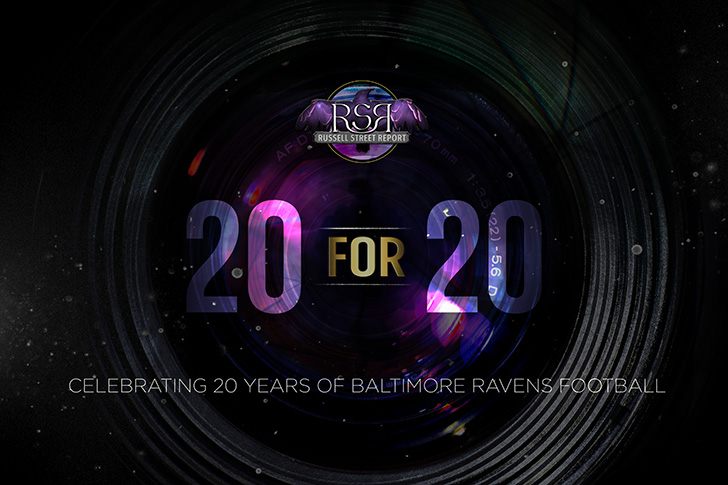On a hot summer day in July of 2008, I found myself in the middle of the Baltimore Ravens team huddle to end a long training camp practice.
To my right was a (very) sweaty Le’Ron McClain, to my left was Troy Smith. Right in front of me was my father – Colonel (and recently appointed Brigadier General) Sean M. Casey – who one-upped my day as he sifted his way through the huddle to stick his hand on Ray Lewis’ as #52 ended the practice with an inspiring message – as always.
After practice, as a 14-year-old Ravens diehard, I proceeded to go on the hunt for autographs, successfully not only acquiring player signatures, but also taking a photo with then-rookie Joe Flacco, and then watching Flacco and Derrick Mason work on some red zone throws.
As a young fan, this was heaven.
But why was I in the huddle?
How in the world did I get to make it onto the field?
A special bond between the Baltimore Ravens organization and the armed forces in Maryland – particularly the National Guard from my experience – has made incredible things happen.
The first encounter was November 2007, before the main force behind the Ravens’ appreciation of Maryland’s troops – John Harbaugh – made his mark on the city.
My father was stationed in Baghdad, Iraq as the Brigade Commander of the 58th Infantry Brigade. Prior to kickoff, as the Ravens were set to run out of the tunnel and take on the Cincinnati Bengals, he and seven fellow guardsmen appeared on the Jumbotron, next to the brigade’s “Task Force Raven” symbol. He greeted the crowd of 70,000+ fans, and then let out an emphatic “HERE COME THE RAVENS!”
 It was the first live feed I had seen of my father in months (this was before the days of Skype and FaceTime), and none of this would have been possible without the overwhelming generosity and respect from the Ravens organization.
It was the first live feed I had seen of my father in months (this was before the days of Skype and FaceTime), and none of this would have been possible without the overwhelming generosity and respect from the Ravens organization.
Fast forward almost eight years, and the initiative by the Ravens and Harbaugh to go out of their way and respect those who serve has reached impressive heights.
In 2014, Harbaugh was named the recipient of the NFL’s Salute to Service award, a long overdue gesture to a man who has left his footprint on the city when it comes to his respect of the military.
Harbaugh’s outreach started in 2008 with the implementation of Military Appreciation Day at training camp. At first, this event was small, as my father and I were joined by about 40-50 other guardsmen and family members. It was a controlled event; easy to handle.
Nowadays, the event is so well-known by Maryland military men and women that entire sections are reserved for soldiers and their families at M&T Bank Stadium during open practices in the summer.
Harbaugh and the rest of the organization – including front office staffer Chad Unitas – have done much more than just appreciate the military during training camp.
Having live feeds with overseas soldiers – like in 2007 with my father – during games has been a continued tradition, but is far from the end of the trail. In 2009 and 2014, Harbaugh made trips to the Middle East to pay his tribute to the in-combat troops, as did Brian Billick in 2007.
In 2013, Harbaugh and his coaching staff took a handful of veterans and rookies to Gettysburg for a “field trip.” Harbaugh wanted the importance of military success to be instilled in his players by having Maryland soldiers explain the trials and tribulations of the Battle of Gettysburg.
One National Guard member who was invited along was my father, who was privileged enough to speak in front of Harbaugh, Flacco and a host of others about leadership, success and failure on the battlefield.
 My father still loves to share the story of how he spent the bus ride home sitting across from Harbaugh, eating Mission BBQ and discussing Ravens football.
My father still loves to share the story of how he spent the bus ride home sitting across from Harbaugh, eating Mission BBQ and discussing Ravens football.
Harbaugh did not need to bring any soldiers along; he could have had the knowledgable tour guides explain each battle in detail. But that was not the point of the trip. Learning about what happened at Gettysburg came second to teaching the players about how to succeed in combat, how to succeed in a war, and how to lift others up through leadership. How better to achieve that than through soldiers with firsthand experience?
Harbaugh’s effort to not only teach his players to respect military members, but also learn from them has certainly worked. Soldiers are not the only heroes in this world, but in terms of admirable figures, they are perfect teaching tools for football players.
Learning how to strategize success in battle and sacrifice oneself physically is an integral part of not only a soldier’s life, but an NFL player’s as well.
Without the sacrifice of my father to serve his country, I would not be able to see firsthand just how much the Ravens organization does for all of the courageous men and women who serve in Maryland.
Harbaugh goes out of his way to pay his dues to the troops in Maryland, and never fails to get his message across in his endeavors.
The genuine approach by Harbaugh and Co. to not only pay their respect to Maryland’s servicemen and women, but also learn valuable lessons from them has been a defining moment in the organization’s 20 years of existence.










